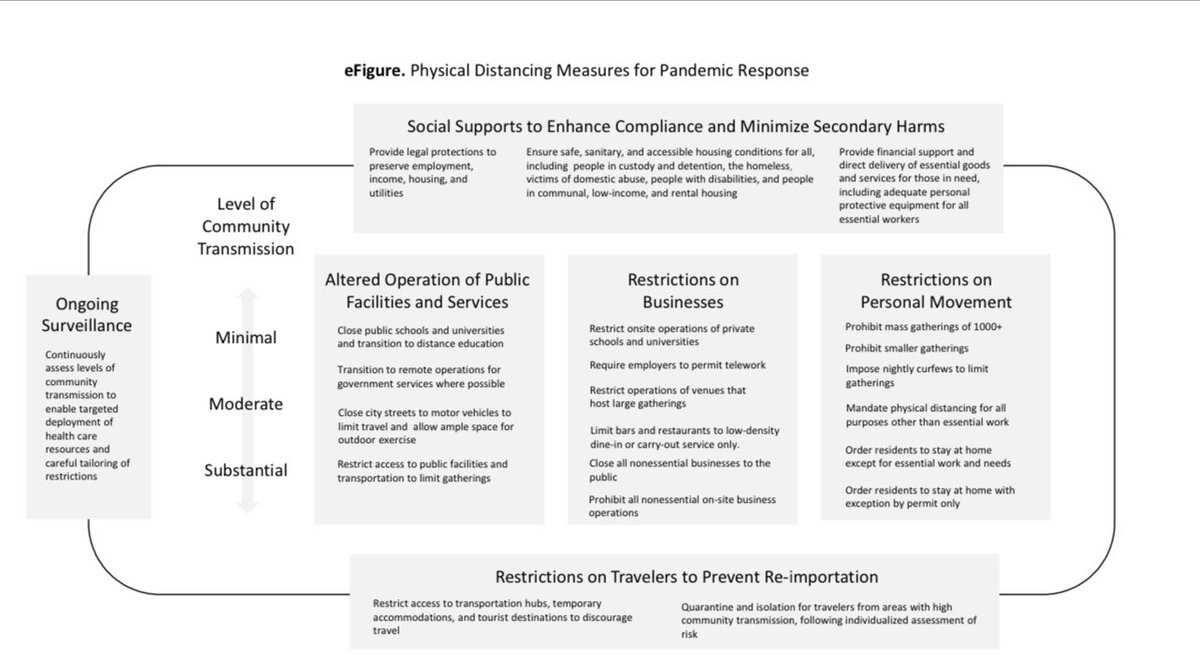1/ Cuomo and others are starting to talk (in very vague terms) about their plans for gradually easing social distancing (eventually, not soon). This raises some important legal and ethical issues that we need to be talking about now, so we& #39;re ready when the time comes:
2/ There’s a pretty good game plan available for carefully moving up (and maybe back down) the spectrum of social distancing interventions in response to evidence re: the level of community spread in any given area.
3/ For social distancing w/in the general population, we can lift mandatory stay at home orders (especially if evaluations indicate that they did not play a significant role in flattening the curve of the epidemic over and above, e.g., closing bars/restaurants/gathering places).
4/ We can gradually ease restrictions on businesses, allowing them to reopen while instituting policies (e.g., limits on how many people can enter at once) to promote physical distancing.
5/ We can eventually reopen schools, especially if we learn more about whether school-age kids play as significant a role in cov-2 spread as they do for flu.
6/ Restrictions on very large gatherings/scheduled events should probably remain in place to some degree in most places until we have a safe and effective vaccine that has been widely administered.
7/ BUT, even (probably especially) when social distancing is eased among the general population, people who are particularly vulnerable to severe Covid-19 will still be advised to "shield" themselves. And this raises important & challenging legal & ethical issues.
8/ People who are vulnerable can be advised/urged to shield by continuing to shelter in place, but they probably can& #39;t be *required* to do so. Mandatory shielding in this scenario would be paternalistic, not based on threat of harm to others that justifies current orders.
9/ Oklahoma& #39;s current order mandating that vulnerable populations (but not others) stay at home is problematic. It *might* be justifiable as protecting others from harm b/c health workers are put at greater risk if hospitals become overwhelmed, though.
10/ But aside mandatory orders, the bigger issue is that if guidelines recommend people over 60/75/whatever age and people with specified underlying health conditions continue to shield, we& #39;re going to need a lot more support and accommodations that current law provides.
11/ Many of the underlying conditions that put one at highest risk for Covid mortality don& #39;t qualify as disabilities protected by employment and education laws. There& #39;s an argument that in the current pandemic context, they would qualify, but ...
12/ Even if asthma, diabetes, etc. become disabilities that trigger legal protections, disability protections in employment and education law don& #39;t readily require schools/employers to accommodate working/schooling from home.
13/ Especially on the large scale we& #39;d be talking about, accommodating staying at home will take massive planning & resources that need to be starting now. The % of the workforce/student pop (incl. colleges/universities) who are particularly vulnerable to Covid is quite high.
14/ Schools, employers, govts need to be thinking about this now. If my university is up and running face to face next fall, how will we accommodate my many students w/ ashtma, diabetes, etc.?
15/ Financial, housing & food assistance, etc. will also need to be massively increased for people who may need to shield themselves by staying at home for the long duration and don& #39;t have the option (even w/ generous accommodations) of doing paid work from home
16/ And what about people who are not particularly vulnerable themselves, but live w/ family/household members who are? Will they be accommodated and supported?
17/ Our safety net is a joke. But even countries w/ strong social security policies aren& #39;t prepared for what lies ahead. For ppl particularly vulnerable to covid, flattening the curve for three months to reduce peak demands on health care systems isn& #39;t enough.
18/ Even if community transmission is low-to-no in a local area, people who are particularly vulnerable (and their household members) will need accommodations & support to shield for the 1-2 years we& #39;ll be waiting (and hoping) for a safe, effective & widely distributed vaccine.
19/ To reiterate: shielding in these circumstances should be a supported and accommodated choice, not an obligation or a criminally enforceable mandate.

 Read on Twitter
Read on Twitter


